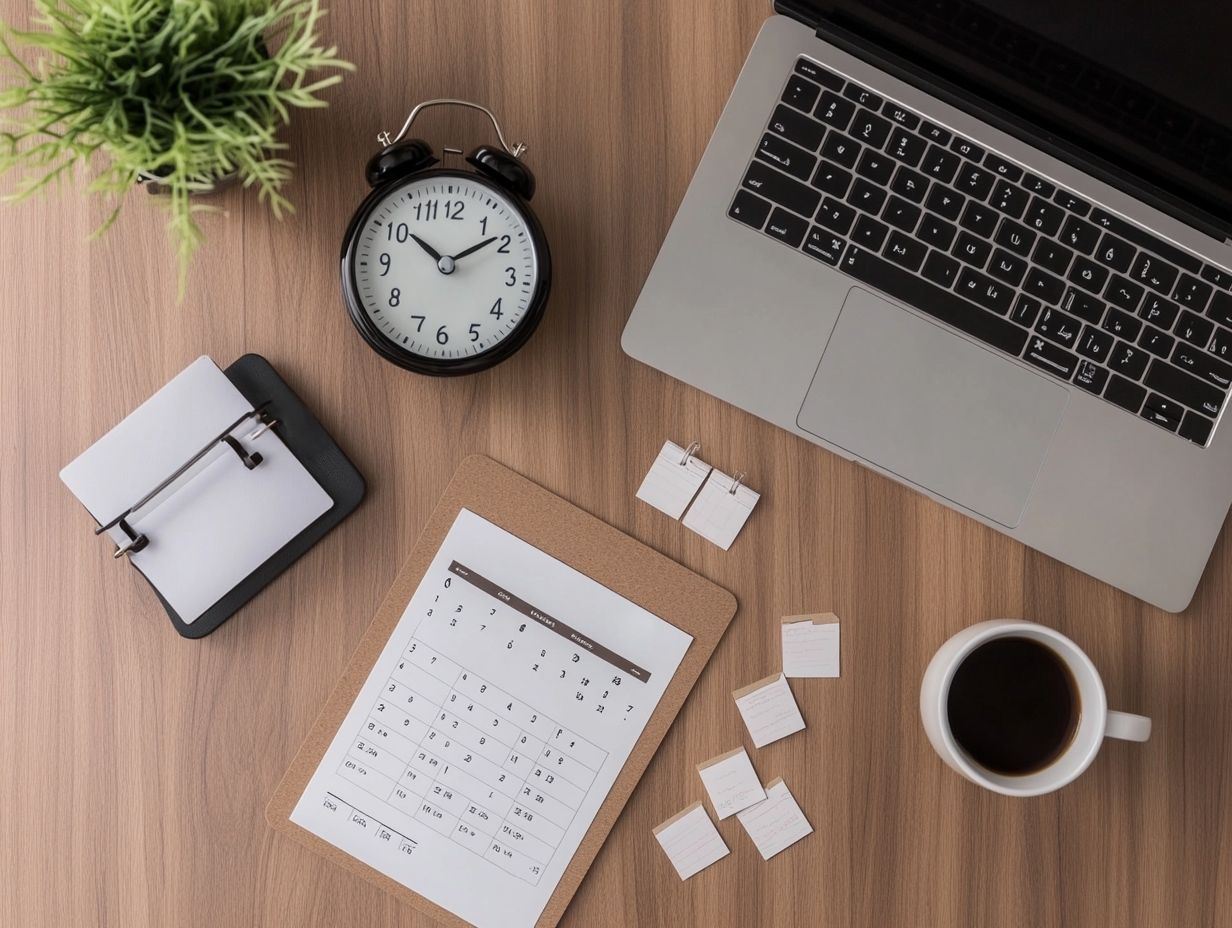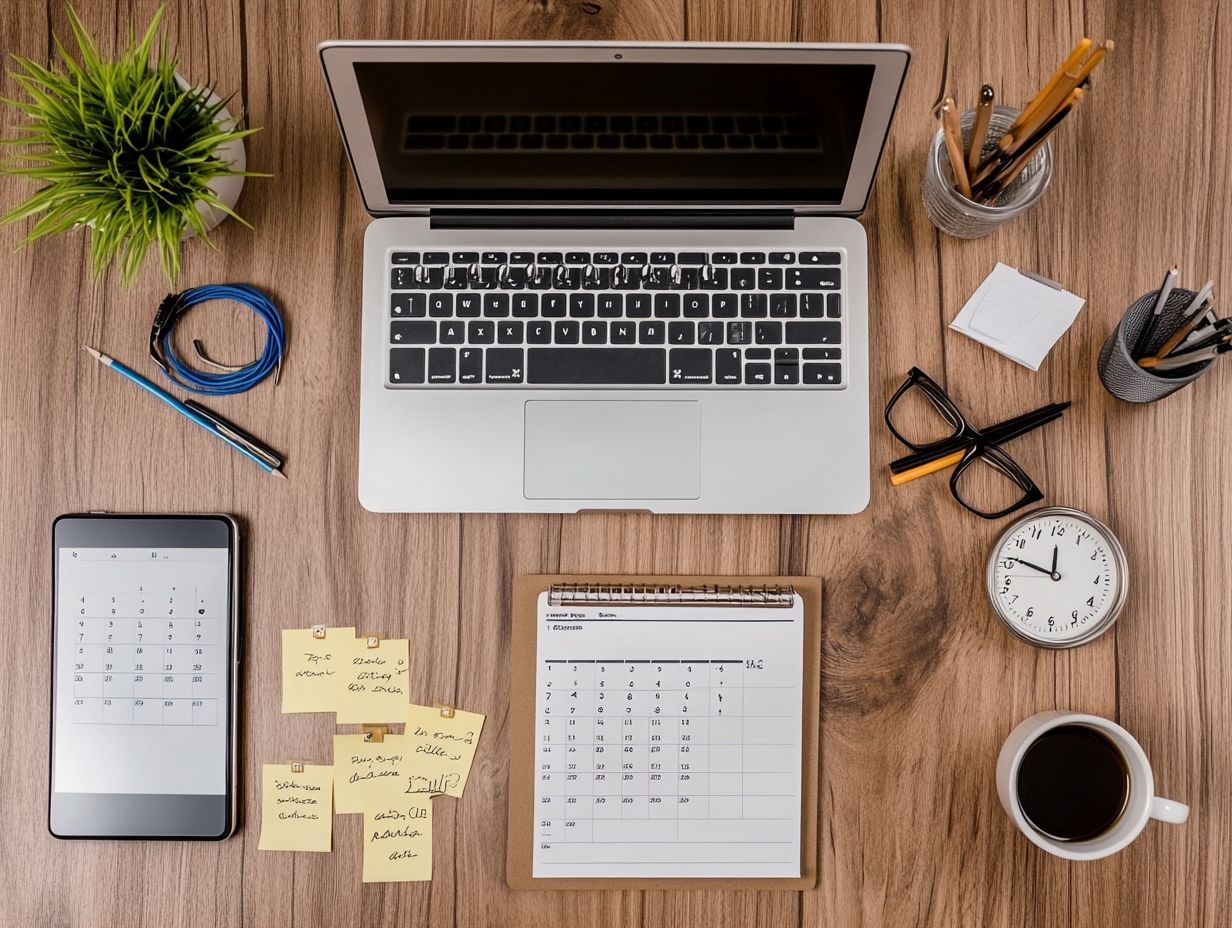10 Tips for Effective Time Management
In today s fast-paced world, managing your time well is essential for your success. With countless demands on your attention, it s all too easy to feel overwhelmed.
Get ready to discover ten powerful tips to enhance your productivity, from setting clear and achievable goals to eliminating distractions and mastering the art of delegation.
You will learn how technology can support your efforts and understand the importance of regular breaks. Whether you re juggling personal and professional tasks or seeking to optimize your daily routine, these insights will empower you to reclaim your time and boost your efficiency.
Contents
- Key Takeaways:
- 1. Set Clear and Realistic Goals
- 2. Prioritize Tasks Based on Importance and Urgency
- 3. Use a Time Tracking Method
- 4. Break Down Large Tasks into Smaller, Manageable Ones
- 5. Eliminate Distractions
- 6. Delegate Tasks When Possible
- 7. Take Regular Breaks
- 8. Don’t Multitask
- 9. Learn to Say No
- 10. Review and Adjust Your Schedule Regularly
- How Can Effective Time Management Improve Your Productivity?
- Frequently Asked Questions
- What are some basic tips for effective time management?
- How can setting goals help with time management?
- Why is it important to eliminate distractions for effective time management?
- How can taking breaks improve time management?
- What are some effective self-care activities for better time management?
- How can using time management tools improve efficiency?
- What should I do if my time management plan is not working?
Key Takeaways:

Set clear and achievable goals to stay focused and motivated.
Prioritize tasks based on their importance and urgency to increase productivity.
Use a time tracking method to identify areas for improvement and track progress.
1. Set Clear and Realistic Goals
Setting clear and realistic goals is essential for managing your time well. It provides you with a structured framework that guides your daily schedule and elevates your personal productivity.
By establishing specific, measurable, achievable, relevant, and time-bound (SMART) goals, you can sharpen your focus and direct your efforts strategically. Influential figures like Stephen Covey highlight the significance of goal-setting in crafting a balanced life, ensuring you stay aligned with your values while maximizing your efficiency.
Applying the SMART criteria gives you the power to set achievable objectives and enhances your strategic thinking. For instance, instead of simply planning to “get fit,” a SMART goal would be committing to jog for 30 minutes three times a week for the next two months. This specificity transforms a vague aspiration into a concrete plan.
Utilizing tools like Lucidchart can help you visualize these goals, making the entire process clearer and more tangible. Covey’s insights encourage you to prioritize tasks based on your personal values, directly feeding into your time management strategies. This allows you to allocate your hours in a way that genuinely reflects what matters most to you.
2. Prioritize Tasks Based on Importance and Urgency
Prioritizing tasks based on their importance and urgency is crucial for effective time management. It enables you to concentrate on what truly matters, meet deadlines with ease, and significantly reduce the risk of burnout.
The Eisenhower Matrix is a simple system to help you decide which tasks to do first, dividing tasks into four distinct quadrants: urgent and important, important but not urgent, urgent but not important, and neither urgent nor important.
By categorizing your tasks, you can clearly identify which activities warrant immediate attention and which can be scheduled for later, bringing clarity to your daily agenda.
To assess the importance versus urgency of each task, think about its impact on your long-term goals and deadlines. Prioritizing accordingly will elevate your productivity, allowing you to manage your time more effectively and channel your energy towards tasks that yield meaningful results.
3. Use a Time Tracking Method
Using a time tracking method is essential for effective time management. It allows you to analyze your productivity patterns and improve the organization of your tasks over time.
By systematically logging how each hour is spent, you can uncover activities that waste time and often go unnoticed think excessive scrolling on social media or meetings that lead nowhere.
There are various digital tools and applications, such as Toggl and RescueTime, that can facilitate this process. They offer user-friendly interfaces and detailed analytics, helping you categorize your tasks more effectively and visualize how your time is allocated.
Integrating tracking into your daily schedule not only fosters accountability but also promotes a proactive approach to detecting inefficiencies. This ultimately guides you toward a more productive and satisfying work routine.
Start implementing these tips today and watch your productivity soar!
4. Break Down Large Tasks into Smaller, Manageable Ones
Breaking down large tasks into smaller, manageable ones is a time management strategy that can transform your approach to productivity. It simplifies organization, reduces stress, and enhances focus.
This method helps you face big projects with ease, creating a clear roadmap for progress. For example, when planning a comprehensive report, consider segmenting it into:
- Research
- Outline creation
- Drafting
- Revision phases
By doing this, each step feels less overwhelming and much more approachable. Incorporate focus techniques like the Pomodoro Technique. This technique involves working for 25 minutes and then taking a 5-minute break. It helps you maintain concentration on these smaller tasks, ultimately leading to improved productivity. You ll feel a rewarding sense of accomplishment with each segment you complete!
5. Eliminate Distractions
To boost your time management and enhance efficiency, it s essential to pinpoint and eliminate distractions that disrupt your focus.
Distractions can be digital or environmental, from incessant smartphone notifications and social media alerts to the noise of traffic or nearby conversations.
To tackle these interruptions, consider implementing strategies such as:
- Designating specific times for checking messages
- Using apps that block distracting websites
Creating a clutter-free workspace can significantly reduce environmental distractions. Incorporate focus techniques like the Pomodoro Technique to help maintain your concentration.
This way, you can optimize productivity while gracefully navigating the inevitable distractions life throws your way.
6. Delegate Tasks When Possible

Delegating tasks is vital for effective time management. It allows you to work together with your team while focusing on your core responsibilities and reducing stress.
Delegating boosts your productivity and cultivates an environment where team members can flourish by leveraging their unique strengths.
Recognizing which tasks can be delegated requires assessing your workload and pinpointing repetitive or less critical activities that others can handle.
Clear communication is essential to streamline the delegation process. Articulate expectations and deadlines while encouraging team members to ask questions or seek clarification.
By doing this, everyone stays aligned, resulting in a more cohesive and efficient team dynamic.
7. Take Regular Breaks
Taking regular breaks is key to staying productive. It enhances efficiency, reduces stress, and promotes overall well-being.
Recent research highlights the importance of intermittent rest for optimal brain function. One effective method is the Pomodoro Technique. This technique suggests you work for 25 minutes and then take a 5-minute break.
This cycle can be repeated several times before indulging in a longer break of 15 to 30 minutes. Adopting this structured approach helps maintain focus and provides the mental rejuvenation necessary for improved creativity and sound decision-making.
By following this schedule, you can experience heightened alertness and sustained productivity, transforming your workday into a more manageable experience while efficiently achieving your goals.
8. Don’t Multitask
Avoiding multitasking is essential for your personal productivity and effective time management. Research shows that concentrating on one task at a time yields better outcomes and enhances the quality of your work.
When you divide your attention among multiple activities, your capacity for deep concentration often diminishes. This scatterbrained approach can lead to mistakes and prolong the time it takes to complete tasks. It can also drain your mental energy and create unnecessary stress, ultimately impacting your overall performance.
To foster a single-task focus, consider employing techniques like the Pomodoro Technique, which involves working in short focused work sessions followed by brief breaks. Additionally, setting clear priorities by crafting a to-do list that highlights essential tasks can be incredibly beneficial.
Minimizing distractions by turning off notifications and establishing a dedicated workspace can significantly bolster your concentration and efficiency.
9. Learn to Say No
Saying no is a powerful skill that can transform your time management. It enables you to maintain focus on your goals while effectively managing distractions.
By recognizing the true worth of your time and energy, you can craft a balanced life that nurtures both productivity and well-being. Setting clear boundaries allows you to prioritize tasks that genuinely matter, rather than getting bogged down by obligations that stray from your main goals.
When someone approaches you with a request that doesn t align with your goals, consider expressing gratitude for the invitation while gently clarifying your current commitments. For example, you might say, I truly appreciate you thinking of me, but I m currently concentrating on a few specific projects.
This not only reaffirms your priorities but also fosters respect for your decisions.
10. Review and Adjust Your Schedule Regularly
Regularly reviewing and adjusting your schedule is a key part of effective time management. It enables you to align with your goals while optimizing productivity by setting appropriate time limits on tasks.
This practice not only reveals which activities are devouring your precious time but also highlights opportunities for improvement. Using time auditing tools can significantly enhance your process, providing valuable insights into how you spend your hours each day.
These tools give you the power to identify productive and unproductive periods, making it easier to adjust your schedule accordingly.
Flexibility is key; as your priorities shift, so should your focus. By embracing adaptability in your planning, your schedule can better reflect your evolving goals and performance levels, ultimately leading to more effective time management strategies.
How Can Effective Time Management Improve Your Productivity?
Effective time management is the cornerstone of enhancing productivity, allowing you to streamline your workflow, prioritize tasks, and maximize your personal output while simultaneously reducing stress.
Breaking your day into focused segments can help you accomplish more in less time, leading to improved results and a healthier work-life balance.
For example, research from the American Psychological Association has shown that professionals who employ structured scheduling techniques experience a 25% boost in their overall productivity.
Consider a project manager who applies the Pomodoro Technique, working in concentrated bursts followed by brief breaks. This method has been proven to enhance focus and prevent burnout, illustrating how strategic time management can lead to remarkable efficiency gains.
What Are the Common Time Wasters and How Can You Avoid Them?

Identifying common time wasters is essential for effective time management, as it gives you the power to dodge distractions and boost your productivity through targeted strategies.
By recognizing pitfalls like excessive time on social media, unnecessary meetings that could easily be replaced with concise emails, and a general lack of organization that breeds inefficiencies, you can take actionable steps to reclaim lost time.
To tackle these challenges, consider setting strict time limits for social media use to help maintain your focus. Implementing a clear agenda for meetings ensures that every discussion is purposeful and straight to the point.
Utilizing productivity tools and breaking tasks into manageable chunks can streamline your workflow, leading to a more effective approach to managing your time.
How Can Technology Help with Time Management?
Technology plays an important role in improving your time management capabilities by offering tools for automation, time tracking, and task organization that streamline your processes and boost efficiency.
For instance, time tracking software gives you the power to monitor how your work hours are allocated, providing clear insights into your productivity patterns and helping you pinpoint areas for improvement.
Project management tools facilitate collaboration, ensuring that your tasks are well-defined and deadlines are met without confusion.
Automation solutions can handle those repetitive tasks you dread, freeing up valuable time for more strategic decision-making.
By integrating these applications into your daily routine, you can cultivate a more organized workflow, reducing stress and increasing your overall effectiveness in both your personal and professional life.
What Are the Benefits of Taking Breaks?
Taking regular breaks brings a wealth of benefits, including enhanced focus, reduced stress, and improved efficiency, making it a crucial element of a productive work routine.
Research supports the idea that breaks can lead to better information retention and spur creativity. For example, a study published in Cognition reveals that short breaks can stimulate brain activity linked to cognitive processes, enabling you to tackle challenging tasks more effectively.
Don t overlook breaks! They are essential for maintaining your energy and focus throughout the day. By implementing effective break schedules like the Pomodoro Technique, which alternates 25 minutes of focused work with 5-minute breaks you can significantly enhance your mental agility.
The Pomodoro Technique is a method that helps you stay focused by breaking work into short intervals, followed by brief breaks. Integrating these brief respites into your daily routine not only boosts your productivity but also fosters a greater sense of well-being and minimizes the risk of burnout.
How Can You Create a Realistic Schedule?
Creating a realistic schedule is essential for your personal productivity, as it enables you to set time limits for tasks while ensuring they align with your goals and priorities. This approach helps you tackle responsibilities efficiently and feel accomplished!
Start by identifying your most critical activities, distinguishing between what s urgent and what s simply important. Once your priorities are clear, break larger tasks into manageable chunks, assigning specific time slots for each to prevent feeling overwhelmed.
Flexibility is equally crucial; unexpected events will happen, and adapting your schedule accordingly will help you maintain your momentum. Regularly reviewing and adjusting your schedule ensures it remains effective.
What Are the Long-Term Effects of Poor Time Management?
Poor time management can have lasting repercussions, manifesting as heightened anxiety, diminished productivity, and a troubling effect on your work-life balance.
When you consistently underestimate the time needed for tasks, you may find yourself in a frantic race against the clock, spiraling into a relentless cycle of stress and fatigue. This oversight can blur the boundaries between your professional and personal life, leaving you feeling overwhelmed both at work and at home.
On the flip side, embracing effective time management strategies can unlock a wealth of benefits, including sharper focus, greater job satisfaction, and improved mental well-being.
By prioritizing your tasks and managing your time wisely, you can gain clarity, fostering personal growth, enriching relationships, and cultivating a more balanced and fulfilling lifestyle.
Frequently Asked Questions
What are some basic tips for effective time management?

1. Set clear goals and priorities. Identify the most important tasks and tackle them first.
2. Create a schedule or to-do list. Plan your day or week to allocate time for specific tasks.
3. Avoid multitasking. Focus on one task at a time to boost your efficiency.
4. Eliminate distractions. Find a quiet, organized workspace to minimize interruptions.
5. Take breaks. Regular breaks help you recharge and stay focused.
6. Delegate tasks. Don t hesitate to ask for help or assign tasks to others.
7. Prioritize self-care. Include self-care activities in your day to avoid burnout.
8. Learn to say no. Avoid overcommitting; decline tasks that don’t align with your goals.
9. Use time management tools. Take advantage of calendars, timers, and task lists to stay organized, and consider implementing 5 strategies for effective time management to enhance your productivity.
10. Review and adjust your plan. Continuously check and tweak your strategies to improve your efficiency.
How can setting goals help with time management?
Setting clear goals helps you prioritize tasks. This keeps you motivated and prevents you from wasting time on less important activities.
Why is it important to eliminate distractions for effective time management?
Distractions waste valuable time and reduce your productivity. By removing them, you can stay focused and work more efficiently.
How can taking breaks improve time management?
Regular breaks help prevent burnout and boost productivity. They give your mind the chance to rest, so you can return to tasks refreshed.
What are some effective self-care activities for better time management?
Self-care activities vary from person to person. Common options include exercising, meditating, and pursuing hobbies to reduce stress and improve well-being.
How can using time management tools improve efficiency?
Tools like calendars and task lists help you stay organized and manage your time better. They allow you to prioritize and track your progress effectively.
What should I do if my time management plan is not working?
If your plan isn’t effective, reassess it. Try changing your schedule or reducing distractions until you find what suits you best.






